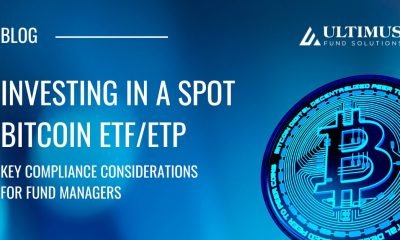As is the case with many of conversations in 2020, the ongoing COVID-19 pandemic, with its attendant market volatility and work-place logistical considerations, has shaped recent topics of discussion popular with boards of mutual funds. Along with that, boards are grappling with viewing many long-favored focus areas through a new lens. At the same time, the wheels of SEC regulation grind forward, generating new rules for consideration, comment, and implementation.
Here are five key topics Ultimus’ legal administration team has seen headlining board discussions through the first half of 2020:
Business Continuity Plans
The importance of business continuity plans (BCPs) came into sharp focus for the mutual fund industry following the two-day shutdown of the NYSE during Hurricane Sandy in 2012 and again in August 2015 when a computer glitch prevented a large financial institution from calculating NAVs for hundreds of funds on a timely basis. In 2016, the SEC issued a guidance update¹ that emphasized the critical nature of BCPs and called on fund complexes to regularly evaluate their BCPs as well as those of their service providers. Consequently, a significant number of boards have taken a great interest in ensuring that their funds’ investment advisers and service providers have robust BCPs in place that will allow them to continue to operate during significant business disruptions.
Before the current pandemic, the mutual fund industry generally expected business disruptions to result from natural disasters or technology issues and last for a few days, at most. COVID-19, however, has kept many employees of investment advisers and service providers away from physical office locations for several months (and counting), requiring the protracted activation of BCPs. Accordingly, boards are more interested than ever in ensuring that advisers and other service providers have robust and effective BCPs in place that are capable of operating without disruption for prolonged time periods.
While technology, including systems that allow employees to access critical systems and files remotely, has largely minimized business disruptions due to COVID-19, the longer-term effects of extended staff and management absence from the office—on employee training and compliance with certain requirements, such as recordkeeping—are still being evaluated.
A Board’s To Do List:
- Conduct due diligence on each service provider’s BCP plan, including a review on the long-term sustainability of operating in a BCP-triggered environment
- Evaluate the service quality of all vendors regularly.
- Document in minutes the results of those discussions with service providers regarding BCPs.
Cybersecurity
Cybersecurity had already been a hot topic for mutual fund boards, and it has been a key examination priority of the SEC for many years.
Employees working remotely due to COVID-19 are operating outside the relative safety of a traditional office, set up and monitored by IT professionals. The increased remote access for employees to systems and files has further heightened the need for diligent cybersecurity monitoring by advisers and service providers.
Compounding this issue, there has been increased targeting of financial institutions by cyber-attackers over the past couple of years. In July 2020, the SEC released a risk alert detailing recent attacks, including observations of an increase in sophistication of ransomware attacks on SEC registrants.
A Board’s To Do List:
- Regularly conduct due diligence on each service provider regarding their data protection and cybersecurity defenses.
- Invite the Chief Information Security Officers to present to the board
- Understand the frequency and scope of any third-party cybersecurity testing for each service provider.
- Ensure that a well-documented communication policy exists in the event of a cybersecurity event.
- Document in minutes the results of those discussions with service providers regarding BCPs.
Valuation
Much to the chagrin of boards, the Investment Company Act of 1940 (1940 Act) has long burdened them with heavy responsibilities for determination of the fair value of their funds’ investments. Collective board anxiety regarding valuation peaked following a 2012 enforcement action by the SEC against eight fund directors for “violating their asset pricing responsibilities.”²
In April 2020, Proposed Rule 2a-5 under the 1940 Act arrived³. The proposed Rule aims to both codify and clean-up a convoluted web of No-Action Letters, SEC staff statements, and commentary in SEC releases, which have shaped current industry practices.
The proposed Rule would allow a board to assign the responsibility of fair valuation determinations to a fund’s investment adviser, subject to the oversight of the board. This change is a welcome balm to boards since they are generally not comprised of pricing specialists and are often not in the best position to assume day-to-day valuation responsibilities. However, there has also been consternation arising from certain reporting requirements. For example, the requirement that the board receive a written report from the adviser “on matters…that materially affect or could have materially affected” the fair value of a fund’s portfolio within three business days of the event may prove to be onerous, or even infeasible, for advisers and boards alike. The final form of the Rule has yet to be seen; the period for public comment ended on July 21.
A Board’s To Do List:
- Discuss with fund counsel and the advisers the proposed valuation rule.
- Discuss with the fund’s Chief Compliance Officer the compliance changes that may be necessary if the Rule is adopted.
Liquidity
The SEC’s liquidity rules, finalized in 2016, required most open-end funds to establish liquidity risk management programs beginning in 2019. As we progress through 2020, boards are preparing for their first review cycle, allowing them to assess the liquidity programs’ adequacy and effectiveness.
At the same time, COVID-19-related market declines and associated mutual fund redemptions naturally triggered liquidity concerns for funds and their boards, as it is imperative that funds have sufficient liquidity to satisfy shareholder redemptions. Rapidly escalating COVID-19 worries led to a dramatic market drawdown that saw the S&P 500 Index drop more than 33% in the 34 days from February 19 to March 23. Investors fled the market, pulling more than $300 billion in assets from mutual funds in the first half of 2020.
A Board’s To Do List:
- Discuss the effectiveness of the fund’s liquidity procedures.
- Gain an understanding from the investment adviser on how the liquidity regulations are embedded in the investment process.
- Document in minutes the results of those discussions.
Shareholder Suits
Shareholders of mutual funds have, in the past, filed class-action lawsuits alleging inadequate or inaccurate disclosure in the fund’s registration statements in violation of the Securities Act of 1933. Targets of these lawsuits may include the fund’s adviser, distributor, and—most concerning for board members—directors and officers. This type of shareholder suit typically occurs after a fund’s NAV decreases significantly. The credit crisis of 2007 set off the most recent wave of these suits. Since then, the industry has mostly been insulated from these suits by eleven years of a bull market. Market declines brought this historic bull market to an end on March 11, 2020, and reawakened the specter of the potential for these types of shareholder suits.
A Board’s To Do List:
- Understand the prospectus disclosures for your fund and discuss any disclosure changes with Fund counsel.
- Actively discuss risks with the investment adviser, the fund’s chief compliance officer, and fund counsel.
- Update the fund’s disclosure, as needed.
- Document in minutes the results of those discussions.
Conclusion
The topics addressed here have long been fodder for discussion by boards of mutual funds, but have been brought to the forefront in 2020 due to broader global events and recent regulatory developments. At the same time, there is seemingly always something new just around the corner. Whether you’re an adviser to a fund or a trustee, it’s imperative that your board is aware of these topics to enable your board members to effectively fulfill their responsibilities as trustees. A skilled legal administration team, such as the experienced team at Ultimus, can help keep your board apprised of the next trending topic.
¹ Available at https://www.sec.gov/investment/im-guidance-2016-04
² Available at https://www.sec.gov/news/press-release/2012-2012-259htm
³ Available at https://www.sec.gov/rules/proposed/2020/ic-33845.pdf




